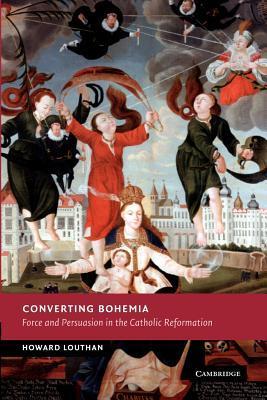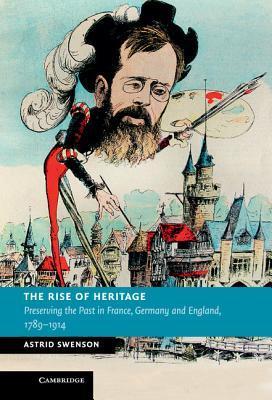


Books in series

Converting Bohemia
Force and Persuasion in the Catholic Reformation
2009

The Rise of Heritage
Preserving the Past in France, Germany and England, 1789–1914
2013

Provincial Power and Absolute Monarchy
The Estates General of Burgundy, 1661-1790
1999

Monarchy, Myth, and Material Culture in Germany 1750–1950
2011

Making the Soviet Intelligentsia
Universities and Intellectual Life under Stalin and Khrushchev
2013

Paris and the Spirit of 1919
Consumer Struggles, Transnationalism and Revolution
2012

Individuality and Modernity in Berlin
Self and Society from Weimar to the Wall
2012

Germans to Poles
Communism, Nationalism and Ethnic Cleansing after the Second World War
2013

West Germany and the Global Sixties
2013

Beyond Violence
Jewish Survivors in Poland and Slovakia, 1944–48
2014

Wine, Sugar, and the Making of Modern France
Global Economic Crisis and the Racialization of French Citizenship, 1870–1910
2014

Export Empire
German Soft Power in Southeastern Europe, 1890–1945
2015

European Elites and Ideas of Empire, 1917–1957
2016

West Germany, Cold War Europe and the Algerian War
2016

Russia and Courtly Europe
Ritual and the Culture of Diplomacy, 1648–1725
2016

Greening Democracy
The Anti-Nuclear Movement and Political Environmentalism in West Germany and Beyond, 1968–1983
2017

Making Prussians, Raising Germans
A Cultural History of Prussian State-Building after Civil War, 1866–1935
2017
The Woman Question in France, 1400-1870
2017

Mussolini's Nation-Empire
Sovereignty and Settlement in Italy's Borderlands, 1922–1943
2017

Debating the Woman Question in the French Third Republic, 1870–1920
2017

Soviet Russians under Nazi Occupation
Fragile Loyalties in World War II
2018

The Politics of Wine in Early Modern France
Religion and Popular Culture in Burgundy, 1477–1630
2018

The Emotional Politics of the Alternative Left
West Germany, 1968–1984
2018

Socialism across the Iron Curtain
Socialist Parties in East and West and the Reconstruction of Europe after 1945
2019

Economistes and the Reinvention of Empire
France in the Americas and Africa, c.1750–1802
2019

1789
The French Revolution Begins
2018

A People's Music
Jazz in East Germany, 1945-1990
2019
Authors

Stephen G. Gross is jointly appointed in the Department of History and the Center for European and Mediterranean Studies at NYU. After working for several years as an economist at the Bureau of Economic Analysis in Washington DC, he completed his PhD at UC Berkeley where he subsequently lectured with the International and Area Studies Program. In his research and teaching Dr. Gross is interested in 20th century Germany, European unification, European and international political economy, energy policy, and international relations. His first book, Export Empire, was published by Cambridge University Press in December 2015. He has also published on a variety of economic themes in German and European history in Central European History, Contemporary European History, German Politics and Society, and Eastern European Politics and Society, as well as in various book chapters. Dr. Gross' first book project—Export Empire: German Soft Power in Southeastern Europe, 1890–1945—explores the relationship between imperialism, economic development, and cultural exchange from the perspective of non-state actors such as trade fairs, research institutes, and professional exchange programs. It traces how German business leaders and academics established commercial hegemony in Southeastern Europe during the 1920s and 1930s. Where scholars have used the concept of soft power to describe the foreign policy of liberal states, he concludes that authoritarian Nazi Germany was also able to exercise its own type of soft power, so long as its private institutions retained the space to operate in the interstices of state power. Where his first monograph explores the commercial power that supported Hitler’s racist imperial ambitions, his second book project will trace how, after 1945, Germany crafted an energy policy that suited a nation heavily dependent on foreign oil and foreign multi-national corporations, and that ultimately enabled Germany to become a leader in renewable energies and energy savings technologies. German Energy Policy in the Age of Oil and Atoms, 1945–2010, as the book is tentatively titled, will explore the political economy of energy crises and transition, tracing how this oil-poor yet highly industrial state managed the transition from coal, to oil, to more renewable fuels, how it negotiated the many intense political and social tensions that came with this transition, and how it inaugurated what is now called the German Energiewende, or revolution to Green energy. By combining an exploration of the material interests involved in the energy sector with newly emerging ideas and scientific paradigms that justified renewable energies, the project aims to provide a more complete understanding of current energy policies in Germany and Europe.
Karen Offen (Ph.D., Stanford University) is a historian and independent scholar affiliated as a Senior Scholar with the Michelle R. Clayman Institute for Gender Research at Stanford University in California. She publishes on the history of Modern Europe, especially France and its global influence; Western thought and politics with reference to family, gender, and the relative status of women; historiography; women's history; the national, regional and global histories of feminism; and comparative history.